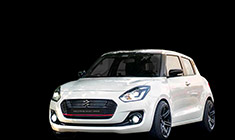News
BMW developing FWD 1-Series sedan
Every automaker worth its salt is hopping onto the platform sharing bandwagon, an approach that allows automakers to share parts and production facilities, to in turn drive down manufacturing costs and retail prices. BMW's platform sharing will happen on the UKL (Unter Klasse/entry-level) platform, an architecture that will underpin a range of affordable, entry level BMW and Mini cars. The platform will support both front wheel drive and all wheel drive layouts.
Note: BMW 1-Series coupe image used in this report is illustrative in nature.
The next generation Mini range, due for a Los Angeles Motor Show debut later this year, will represent the first cars to use the UKL platform, while the likes of the next-generation models of the 1-Series and X1 will follow suit. BMW also has plans of building an affordable roadster dubbed the Z2, on the UKL platform.
Eventually, the German luxury car maker plans to spin off no less than a dozen new cars on the UKL platform, over the next 8-10 years. BMW's rival Mercedes Benz has followed a similar tactic with the Modular Front Architecture (MFA) range of cars including the A-Class, B-Class, CLA sedan and GLA crossover models.
Among the enthusiast community, there has been apprehensions about BMW losing its traditional, longitudinal engine mounting-rear wheel drive layout. While enthusiasts fear that the FWD layout of UKL cars would dilute the fun-to-drive nature of future, entry-level BMWs, the car maker has assured fans of retaining the "joy of driving" element in the UKL-based cars too.
According to a report on the AutoNews, a front wheel driven (FWD) 1-Series sedan is in the works. This car will rival the likes of the Mercedes Benz CLA and Audi A3, and will be based on the UKL platform. The FWD 1-Series sedan is likely to arrive in 2017, until when the current, rear wheel driven 1-Series range will continue to motor on.
The FWD 1-Series sedan is code-name the NES, an acronym for new entry-level sedan. The car is likely to be offered with small capacity, turbo petrol and turbo diesel engines, in both 3 and 4 cylinder transversely mounted engine layouts. The car could also get a hybrid power options, in keeping with BMW's march towards electric and hybrid cars.
The 1-Series sedan will sit beneath the 2-Series and 3-Series ranges in terms of price and positioning. While the F30 3-Series sedan has grown significantly in size when compared with the model it replaced, the 2017 UKL-based 1-Series sedan isn't expected to gain in terms of size when compared to the current 1-Series range.
The reason for this is the 2-Series models, which will be offered in coupe and convertible forms from mid-2014, as the replacement of the 1-Series coupe and convertibles. Therefore, the 2017 1-Series model is likely to remain smaller than the 2014 2-Series models.
Countries like India, China and Brazil, with their growing affluent classes are likely to be the targets of the new 1-Series sedan. Given the fact that BMW has launched the 1-Series hatchback in India, as its least priced luxury car, the likelihood of the automaker launching the 2017 1-Series sedan here remains quite high.











_0.jpg)




